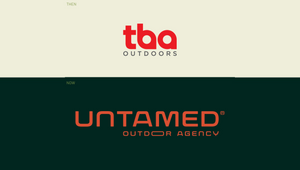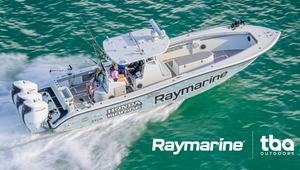
The New New Business: Courtney Olbrich on Putting in the Work Upfront

A master of understanding your target audiences, Courtney Olbrich is masterful at driving impactful, business-driven results by leveraging more than 20 years of marketing expertise. She dives deep, analysing your business and your customers from every angle, to uncover their motivations and preferences. This deep understanding fuels the creation of integrated-marketing solutions that resonate and drive results.
Throughout her career, Courtney has partnered with a diverse range of national, regional, and local clients, from automotive giants and e-commerce powerhouses to healthcare providers, professional sports teams, and travel destinations. No industry is off limits for her marketing magic, and her success speaks for itself. Courtney’s expertise has helped propel brands such as Daytona Beach, Security Finance, Bell Legal, Idahoan, and Green Giant to even greater heights.
LBB> What was your first sale or new business win? (Was it a big or small job? How difficult or scary was it? What do you remember about how you felt? What lessons did you learn?)
Courtney> My first real win was when I was working at CBS Radio (now Audacy) in Detroit, specifically at the sports station. I sold the station inventory and the local and state-wide radio play-by-play inventory for the Detroit Tigers, Lions, Red Wings and Pistons.
I partnered with a metro Detroit jeweller that I met by networking and worked on a comprehensive radio and digital program that featured ads on the radio station, its website and in play-by-play inventory during the Detroit Red Wings games. The creative highlighted select Red Wings players touting the excellence of Breitling watches and buying them at that specific jeweller. It was the first time that this jeweller had ever been open to advertising with our radio group, and was a big win (for me at least!) in the six figures.
The program was a great success.
I remember during the sales process feeling every emotion from being excited and confident to nervous and having imposter syndrome. That sale gave me so much confidence as I moved forward into that stage of my career, knowing I could trust myself to put together unique programs that truly move the needle for clients.
I also learned that programs/campaigns will change during the process, and not to be frustrated with that, because usually what you end up with at the end is equally good or better to where you originally started.
LBB> What was the best piece of advice you got early on?
Courtney> Don’t celebrate until the contract is signed in ink, and that the last 5% of closing a deal, from verbal agreement to signature, is sometimes the hardest part that takes the longest amount of time. Have patience and be transparent throughout that part of the process.
LBB> And the worst?
Courtney> “Sales is purely a volume play - so reach out to as many prospects as possible.” While volume is incredibly important to build a sales pipeline, what you’re pitching and who you’re pitching it to is most important. Doing research and having genuine conversations to understand a prospect’s industry and business problems is much more important.
At the end of the day, we’re not here to pitch ourselves, we’re here to understand their issues and come up with custom solutions to solve them in the most cost-effective way. You cannot do that easily by sending out the same canned message to everyone, just to get your volume up. It’s quality over quantity.
LBB> Can anyone be taught to sell or do new business or do you think it suits a certain kind of personality?
Courtney> I think anyone can be successful at sales, but I think it’s definitely an easier fit for some personality types than others.
For example, if you’re looking at the DISC personality assessment, I think people who have DI in their personality profile have a natural predisposition for sales. In being focused on tasks, they like to make decisions and adjust if needed as new information comes in, and they are outgoing when dealing with people.
Someone with an SC personality type might need to flex a bit harder from what’s natural for them to do those same things, as they’re a bit more prone to needing all details before making a decision and are more on the reserved side. They can absolutely do the things needed to be fantastic at sales, but it might require a bit more mental energy and flexing from their natural style to do some of the things needed. But I believe anyone can do it.
LBB> New business and sales can often mean hearing ‘no’ a lot and quite a bit of rejection - how do you keep motivated?
Courtney> I tell my team there are three things needed to be successful at sales: attitude, aptitude and resiliency. Maintaining a positive attitude in the midst of receiving a rejection can be hard, and that’s why it’s important to always have multiple projects and prospects you’re working with at once, so hearing one “no” from a prospect doesn’t send your entire pipeline and mental health crashing.
You can jump to working on another project quickly so you don’t dwell on the loss.
Aptitude for learning is paramount to continue to not only understand the ever-changing advertising and agency business, but also the changes in every prospect vertical where we need to stay up to date. Learning new things and having new reasons to reach out to prospects can help someone stay motivated as well.
Finally, and most importantly, being resilient is the only way someone is going to be happy in a sales career. Even if you’re the best salesperson possible, rejections will still come, and there’s no way to avoid them.
I tell my team - If you’ve left a pitch leaving everything on the table, doing your best and providing the best solution possible to a prospect, then at that point, you’ve done everything you can to influence their decision. If it comes back as a loss, you can still have the confidence that you wouldn’t have done anything differently, and that makes it easy to stay motivated, knowing that sometimes, the chips just don’t fall in your favour, and it’s not a reflection of the job you’ve done.
LBB> The advertising and marketing industry often blurs the line between personal and professional friendships and relationships…does this make selling easier or more difficult and delicate?
Courtney> I think it makes it easier to get into the door for potential pitches when you have developed business relationships that have turned into friendships. Getting that initial seat at the table is a huge benefit.
But the bottom line is that the agency/vendor that wins the work has to execute to a level that makes the client happy, and that can become a much more delicate situation when there’s a friendship involved. You’re then at risk of not only losing the business partnership, but losing a friendship as well if things don’t go well in the execution of the work.
LBB> In your view, what’s the key to closing a deal?
Courtney> In my opinion, the biggest key to closing a deal is putting in the work upfront during the first few meetings you have with a prospect.
It’s paramount to ask deep questions into their needs, problems, goals and what success would look like and then bring that information back to the agency pitch team in a way that truly guides the pitch outline.
If another agency wins and it’s not just because a prospect liked the look of their creative better, but that the other agency’s pitch was truly hitting the mark better, then that usually means that the upfront conversations we’ve had as salespeople weren’t deep enough.
We can usually find that information out by asking for and following up on pitch feedback from the prospect even if we’ve lost the pitch, and using that insight to learn and inform the types of questions we ask to future prospects.
LBB> There’s a lot of training for a lot of parts of the industry, but what’s your thoughts about the training and skills development when it comes to selling and new business?
Courtney> I don’t think there’s enough training for new business in general in the advertising industry. A lot of training programs I’ve seen have been promoting the same techniques for years, even as prospecting techniques have been completely overhauled in the digital age. I find it’s most beneficial to send my team to training on individual skills needed for selling and new business, vs an overall selling course. Those can include public speaking, persuasive speaking, CRM best practice training, active listening etc.
LBB> What’s your advice for anyone who’s not necessarily come up as a salesperson who’s now expected to sell or win new business as part of their role?
Courtney> My best advice is to just be yourself. People can tell when you’re being authentic vs when you’re “selling” them. If you’re truly yourself and you’re passionate about your discipline, what you’re recommending and what your agency/company stands for, that shines through and that’s most important.
Secondly, in the video conferencing world that we live in, put all distractions aside and be present with eye contact for the entirety of a meeting with a prospect, even if there’s multiple people on the call and you’re not speaking.














